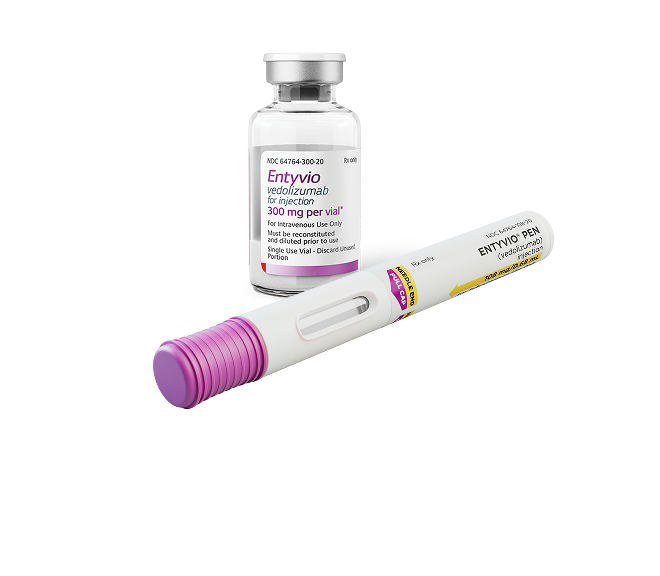For adults with moderately to severely active ulcerative colitis (UC) or Crohn’s disease (CD).

The only gut-focused
biologic* for Crohn’s and UC
that works right where U need it
†
†Based on a quarterly analysis of Symphony medical and pharmacy claims with data from October 2023 through September 2024.
*ENTYVIO specifically binds to the α4β7 integrin and blocks its interaction
with MAdCAM-1, which is mainly expressed on the gut endothelial cells.1


Focus
U Want
Helps block certain
inflammation-causing lymphocytes
from entering the gut1
ENTYVIO specifically
binds to the α4β7
integrin and blocks
its interaction with
MAdCAM-1, which is
mainly expressed on
the gut endothelial
cells.1

Results
U Need
Lasting relief and
CS-free remission
at Week 521‡
Rapid symptom relief
as early as Week 61‡
Individual results may vary.
‡Many patients taking ENTYVIO IV achieved remission at Week 52 vs placebo, some without steroids. Some achieved remission at Week 6. Clinical remission was defined as Crohn’s CDAI score ≤150 or UC complete Mayo Score of ≤2 points and no individual subscore of >1 point. CS-free remission is the proportion of patients receiving corticosteroids at baseline and who discontinued steroids and achieved clinical remission.

Experience
U Expect
More than 10
years of patient
experience§
2 options for
maintenance therapy:
ENTYVIO IV and
the ENTYVIO Pen1||
§Based on Symphony claims data from June 2014 to preliminary November 2024.
||The ENTYVIO Pen is an option after at least 2 IV infusions.1

Support
U Deserve
Over 90% unrestricted
commercial coverage
for ENTYVIO IV and
growing coverage for
the ENTYVIO Pen¶
1-on-1 support
for ENTYVIO
patients through
EntyvioConnect
¶For IV, unrestricted refers to coverage that does not require biologic step-edits. For pen, covered commercial lives include unrestricted coverage and biologic step-edits. Data are derived from Managed Markets Insight & Technology as of December 2024 (IV) and January 2025 (pen).
CDAI=Crohn's Disease Activity Index; CS=corticosteroid; IV=intravenous; MAdCAM-1=mucosal addressin cell adhesion molecule-1.
GEMINI I
GEMINI I was a randomized, double-blind, placebo-controlled study of
adult patients with moderately to severely active ulcerative colitis1
THE FOUNDATIONAL STUDY OF ENTYVIO (vedolizumab) VS PLACEBO
Patients achieved clinical response at Week 6 and clinical remission at Week 52 vs placebo.1
VARSITY TRIAL
VARSITY, which studied ENTYVIO vs Humira® (adalimumab), was the first
head-to-head trial of biologics in moderate to severe ulcerative colitis2,3
ENTYVIO: Superior to Humira®*
In clinical remission at Week 52 in the overall population.2†
VARSITY was a double‑blind, double‑dummy, active‑controlled trial that compared ENTYVIO with Humira® (adalimumab) in adults with moderately to severely active ulcerative colitis.
*Humira® is a registered trademark of AbbVie Inc., North Chicago, IL. For information about Humira®, please see AbbVie.com.
†Clinical remission was defined as a complete Mayo Score of ≤2 points and no subscore >1 point. Superiority was demonstrated in the overall population. Individual results may vary.
Up to 7 years of consistent
safety data
Clinical trials evaluated safety in more than
3300 adults (UC, Crohn's, and healthy
volunteers).1
A separate open-label study of up to 7 years
demonstrated consistent results across
safety parameters.1,4,5*
*In a single-arm, open-label extension study, 2243 patients
received ENTYVIO IV with a median exposure of 1072 days (range 1 to 3412 days).4,5
Support for patients prescribed ENTYVIO
EntyvioConnect offers a range of programs tailored to help patients with access and affordability.
The content on this page has been written and
reviewed by Takeda.
References:
- ENTYVIO (vedolizumab) prescribing information. Takeda Pharmaceuticals.
- Sands BE, Peyrin-Biroulet L, Loftus EV Jr, et al. Vedolizumab versus adalimumab for moderate-to-severe ulcerative colitis. N Engl J Med. 2019;381(13):1215-1226.
- Macaluso FS, Maida M, Grova M, et al. Head-to-head comparison of biological drugs for inflammatory bowel disease: from randomized controlled trials to real-world experience. Therap Adv Gastroenterol. 2021;14:1-11.
- Loftus EV Jr, Feagan BG, Panaccione R, et al; for the GEMINI LTS study team. Long-term safety of vedolizumab for inflammatory bowel disease. Aliment Pharmacol Ther. 2020;52(8):1353-1365.
- Data on File. Takeda Pharmaceuticals.


